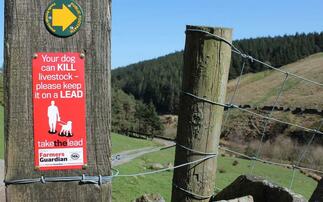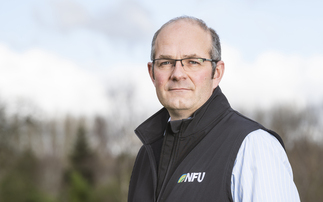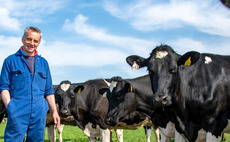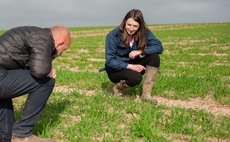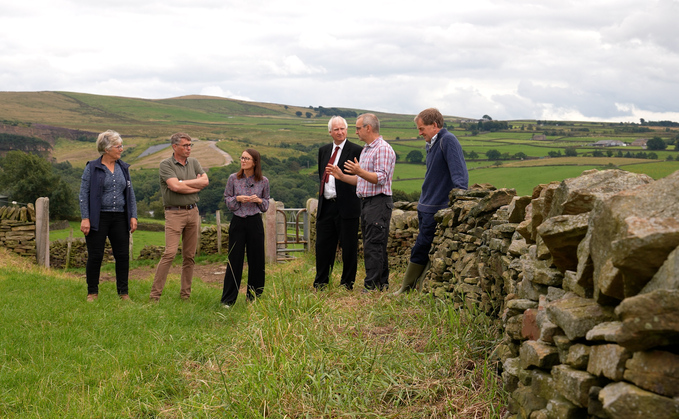
Daniel Zeichner visited farmers to hear their views on right to roam
Seeing up to 26 million visitors each year, the Peak District is one of the UK's most popular beauty spots and for farmers working in and around it, public access is never far from their minds.
It is why the Labour Party's plans to enshrine open access to the countryside in law has prompted a debate around the impact it would have and, importantly, if ‘default access' is actually needed.
And for farmers speaking at Farmers Guardian's roundtable held at Bank Head Farm, an upland dairy farm in the Peak District, Derbyshire, it is as divisive as Labour's policy on bovine TB.
Upland land manager Tom Noel, whose farm is in a Site of Special Scientific Interest (SSSI), said he understood the importance of giving the public opportunities to connect with nature, but that 'free open access' could do more damage than good.
Mr Noel said: "We do not want to be shooting ourselves in the foot as we try to protect and enhance biodiversity. You see particularly areas where ground nesting birds are nesting, dippers going up stream have gone with people wild camping on the side. Curlews are also going.
Right to roam
"Where you have already got open access areas that is very noticeable I would say. Areas of the farm where there is no public access you do see more ground nesting birds undisturbed."
Dairy farmer David Handford said there were already several public footpaths running through his fields, including directly through his farm yard and added ‘access to nature' was not an issue.
He feared greater access will leave farmers with no options and make it ‘impossible' to run the business, but also be a safety risk too.
"People can walk along the linear path and we know where that path is," said Mr Handford.
"When we have a bull in the field, we can put the cow with the bull away from the footpath. It is about leaving the farmer with options."
Nervous about what expanding access to his farm would mean for his business, he said he would rather sell up.
"If a broad brush general access came into place, there would be a sale sign at the end of the road," he said.
Mr Zeichner, the MP for Cambridge since 2015, attempted to allay farmers' fears, going on to criticise ‘right to roam' as a policy name and the simplified message the term sends out and admitted he would like there to be a ‘different phrase' used.
Labour party
"We do not want a free for all - I have been clear of that, it is not what the Labour Party is about," said Mr Zeichner, conceding right to roam was a loaded, short-hand term but a change in policy name was ‘never going to happen' so close to a general election.
"The emphasis has got to be on people behaving responsibly. The trouble is there are plenty of people that do behave responsibly, it is those people that do not."
Jane Bassett, who runs a suckler beef and sheep enterprise, agreed attitudes among some visitors was a problem, but they would be difficult to change.
"They already think they have got open access," she said, noting the Covid-19 lockdowns as a turning point.
"In a few short years, the attitude of people has altered, they look at a map and look at phone and think they can go everywhere. I do not want to be in confrontation. I want people to enjoy the countryside. There are visitors, customers, there are positive benefits but at the same time we do not want them to destroy what we are trying to protect."
Andrew Critchlow, who runs a flock of 260 sheep and has 48.5ha of in-bye land and 93ha of moorland in the Peak District suggested Labour could placate both sides of the debate by changing the name to ‘right to roam - on a footpath'.
Mr Zeichner laughed, but pointed out that if he was in the position to change the name the word ‘responsibility' would be included and said a ‘debate would be more helpful around the phrase altogether'.
Right to roam, alongside bTB, are policy areas which will likely determine which box is ticked on the ballot paper and it is something Labour will be acutely aware of as the party attempts to secure the rural vote.
Farmers around the table warned against bowing to extreme right to roam campaigners, highlighting that most of the public would not have strong opinions either way.
Mr Noel added: "To be responsible you need to show that you are listening to the middle chunk of all of us, who are fed up of the noise and would rather we all sat round like this and listened."
Farmers around the table all nodded at this point, to which Mr Zeichner responded, ‘it is the sweet spot we are trying to find'.
Mr Critchlow added: "People are looking for circular walks. Many farmers would be willing to create more logical footpaths, particularly urban fringe farmers to make circular routes."
He warned Mr Zeichner the defining policies for farmers under Tony Blair's Labour Government were the Countryside and Rights of Way Act and the hunting ban.
"It would be a big shame if there was change in Government and you were defined again by a badly brought in greater access policy," said Mr Critchlow.
Urban and rural divide
"You talk about that urban and rural divide - that would only get worse."
Mr Zeichner said right to roam would work differently across different areas of the country, leaning towards the idea that local authorities and local councils including parish councils, would need to be involved in delivering the policy on the ground.
"We may need different solutions in different places," he added.
"There are a number of things that are going on here which has all gone into one simple phrase which does not do justice to the complexity. It is not surprising after having this discussion that we need to relook at the legislation."















